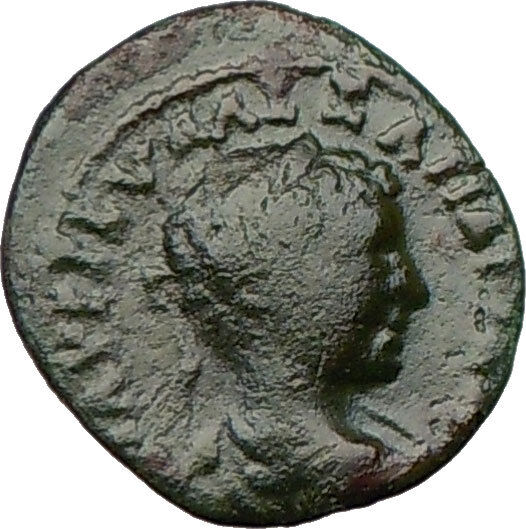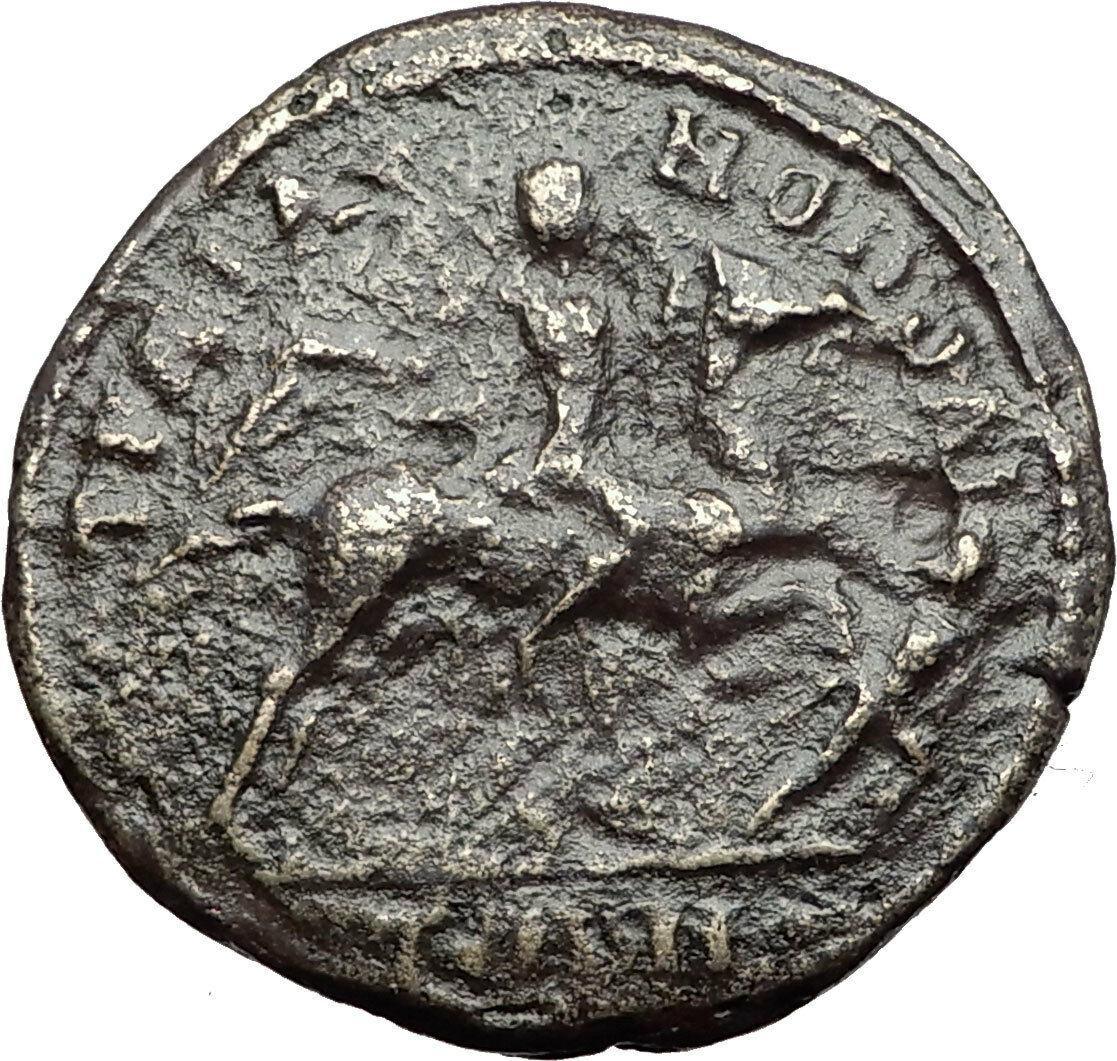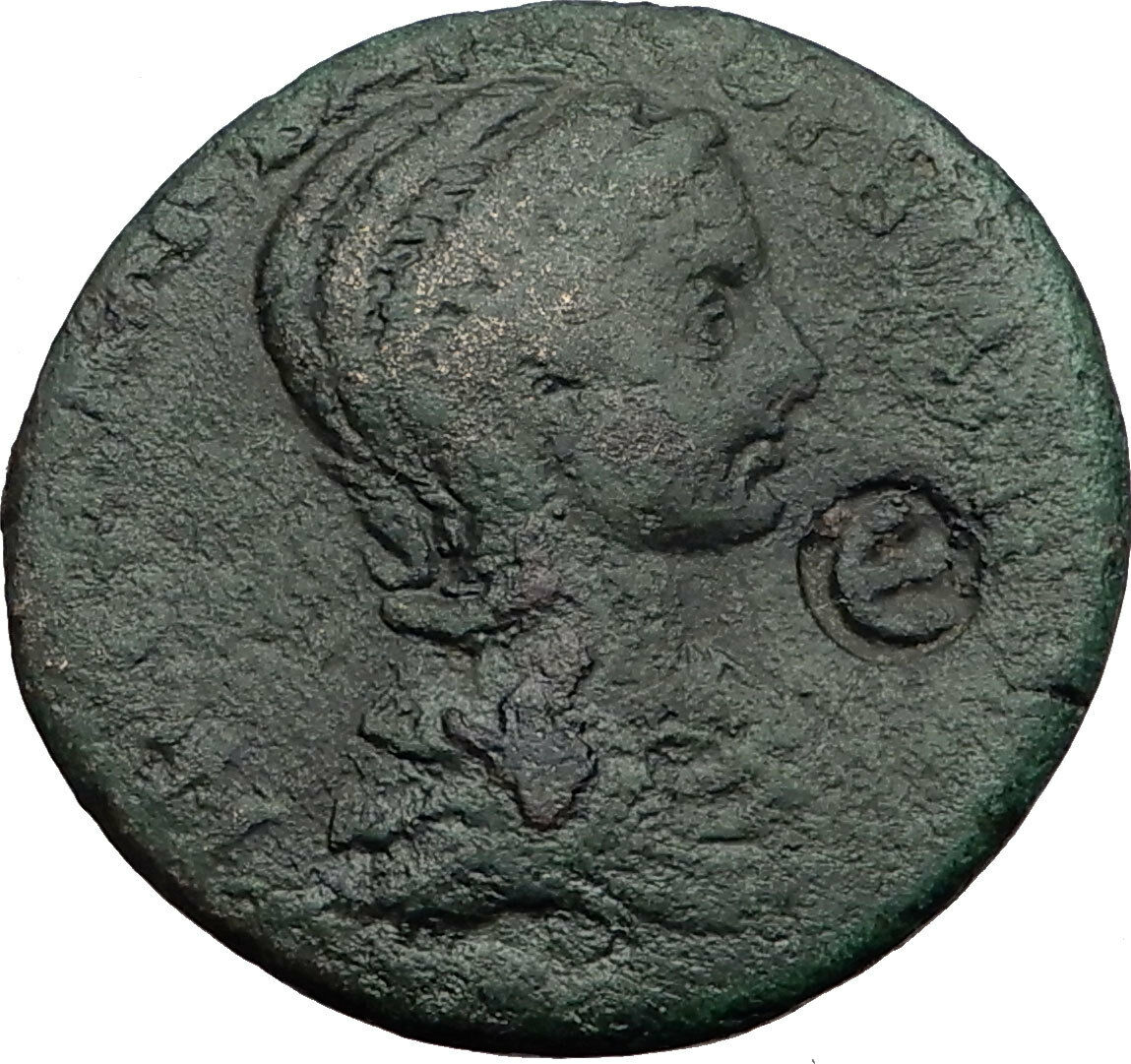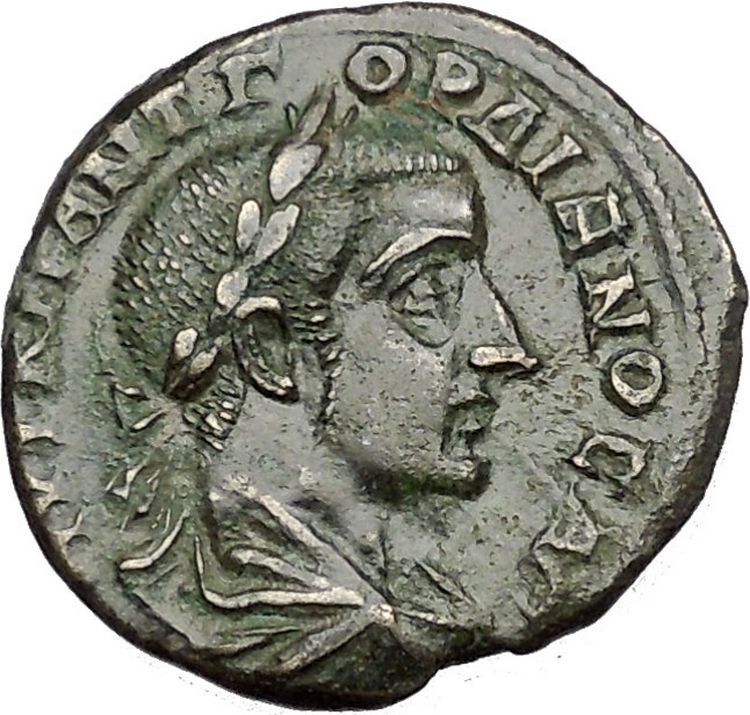|
Fulvia -1st wife of Mark Antony
Bronze 19mm (5.85 grams) of Eumeneia in Phrygia. Struck circa 41-40 B.C.
Zmertorix, son of Philonides, magistrate.
Reference: RPC I 3139; SNG München –; BMC 20-1; SNG Copenhagen –.
Draped bust of Fulvia (as Victory) right.
Athena standing left, holding shield and reversed spear; ΦOYΛOYIANΩN downward to right, ZMEPTOPIΓOΣ/ΦIΛΩNIΔOY in two lines downward to left.
Fist wife of Mark Antony whom she married in B.C. 44. She died at Sicyon in 40 B.C. Fulvia was first married to P. Clodius, the Roman firebrand. After his violent death in 52 BC, she married C. Scribonius Curio, who likewise met an untimely end in Africa. She married Mark Antony in 44 BC, and became an outspoken defender of his interests in Rome while he campaigned in the east (and enjoyed the attentions of Cleopatra). The city of Eumenia was re-named Fulviana in her honor by Antony’s partisans. By 40 BC, Fulvia’s strident attacks on Octavian had provoked a reaction, and she had to flee first to southern Italy and then to Greece. She met Antony at Athens, where he upbraided her for antagonizing Octavian when he was trying to maintain a semblance of cordial relations. Fulvia died at Sicyon shortly thereafter. Some examples of these coins show that the ethnic was removed from the die and two countermarks were applied, one that was the monogram of old Eumeneia, and the other probably of the magistrate Zmertorix, possibly proclaiming that he did not think such a renaming of the city was a good idea in the first place.
You are bidding on the exact item pictured, provided with a Certificate of Authenticity and Lifetime Guarantee of Authenticity.
 Fulvia (c. 83 BC – 40 BC) was an aristocratic Roman woman who lived during the Late Roman Republic. She gained access to power through her marriage to three of the most promising men of her generation, Publius Clodius Pulcher, Gaius Scribonius Curio, and Marcus Antonius. All three husbands were politically active populares, tribunes, and supporters of Julius Caesar. Though she is more famous for her involvement in Antony’s career, many scholars believe that she was politically active with all of her husbands. Fulvia (c. 83 BC – 40 BC) was an aristocratic Roman woman who lived during the Late Roman Republic. She gained access to power through her marriage to three of the most promising men of her generation, Publius Clodius Pulcher, Gaius Scribonius Curio, and Marcus Antonius. All three husbands were politically active populares, tribunes, and supporters of Julius Caesar. Though she is more famous for her involvement in Antony’s career, many scholars believe that she was politically active with all of her husbands.
Fulvia is remembered in the history of the late Roman Republic for her political ambition and activity. She is most famous for her activities during her third marriage and her involvement in the Perusine War of 41-40 BC.
She was the first Roman non-mythological woman to appear on Roman coins.
Fulvia was born and raised either in Rome or Tusculum. Her date of birth is not known. Fulvia was a member of the Fulvia gens, which hailed from Tusculum. The Fulvii were one of the most distinguished Republican plebeian noble families in Rome; various members of the family achieved consulship and became senators, though no member of the Fulvii is on record as a consul after 125 BC. Fulvia was the only child of Marcus Fulvius Bambalio and Sempronia. Her father Marcus received the nickname Bambalio, from the Latin to stutter, because of his hesitancy in speech. Her maternal grandfather was Sempronius Tuditanus, who was described by Cicero as a madman, who liked to throw his money to the people from the Rostra.
Her first marriage was to Publius Clodius Pulcher, circa 62 BC. Fulvia and Clodius had two children together, a son also named Publius Clodius Pulcher and a daughter, Clodia Pulchra. As a couple they went everywhere together. Clodia later married the future Emperor Augustus.
In 52 BC, Clodius ran for praetor and political competition with a consular rival, Titus Annius Milo, escalated to violence. Milo and his gang killed Clodius on January 18 on the Appian Way, the road built by Clodius’s ancestors. Fulvia first appears in the record after his death. She grieved over his body publicly and dragged it through the streets of Rome which, due to his popularity, incited an angry mob that took his corpse and cremated it in the senate. Fulvia and her mother Sempronia were present at the trial of Milo, and Fulvia’s was the last testimony given by the prosecution. Milo was exiled for his crime.
While alive, Clodius had control of many gangs, and Fulvia retained the power and status that came with their loyalty. There is some evidence that she may have been involved in organizing the collegia. As Clodius’ widow and mother of his children, she was also a symbol and reminder of him, and was able to transfer this power to her future husbands.
Marriage to Scribonius Curio
Her widowhood did not last long, as the customary period of mourning for Romans was ten months. Fulvia most likely married her second husband, Gaius Scribonius Curio, soon after this period had passed. They were married in 52-51 BC. Like Clodius, Curio was very popular with the plebeians. He was from a less distinguished family than Clodius, being from a new consular family, but he may have had more wealth. Though initially an optimate, Curio became a popularis soon after marrying Fulvia, and continued many of Clodius’ popularist policies. He soon became important to Gaius Julius Caesar and Clodian supporters. In 50 BC, the year after he married Fulvia, Curio won election as a tribune.
Curio was killed while fighting for Julius Caesar in North Africa in 49 BC, by the army of King Juba I of Numidia. During the civil war, Fulvia was most likely in Rome or nearby, due to Caesar’s troops taking over Italy. At the time, she would have had her two children by Clodius and was either pregnant with Curio’s son or had delivered him.
Marriage to Mark Antony
After Curio’s death in Africa, Fulvia was still an important widow in elite circles. She provided an important tie to Clodius and his clientela, had proven her fertility, and could offer a husband money and political organization. Also, her husband would become the stepfather of Clodius’ children, further linking him to Clodian politics.
Fulvia’s third and final marriage was to Mark Antony in 47 or 46 BC, a few years after Curio’s death, although Cicero suggested that Fulvia and Antony had had a relationship since 58 BC. Cicero wrote about their relationship in his Philippicae as a way of attacking Antony. According to him, while Fulvia and Antony were married, Antony once left a military post to sneak back into Rome during the night and personally deliver a love letter to Fulvia describing his love for her and how he had stopped seeing the famous actress Cytheris. Cicero also suggested that Antony married Fulvia for her money. At the time of their marriage, Antony was an established politician. He had already been tribune in 49 BC, commanded armies under Caesar and was Master of the Horse in 47 BC. As a couple, they were a formidable political force in Rome, and had two sons together, Marcus Antonius Antyllus and Iullus Antonius.
Plutarch believed that Fulvia heavily influenced Antony, and that former Clodian policies were continued through him. Throughout their marriage, Fulvia defended Antony from Cicero’s attacks, sustained his popularity with his soldiers and hindered Octavian’s ascension to power. In fact, Fulvia still retained the support of gangs formerly ruled by her first husband, Clodius. Antony was able to gather that support by publicly associating himself with Clodius’ children. Through Fulvia, Antony was able to use Clodius’ gangs in his own gang wars against Dolabella.
After Gaius Julius Caesar was assassinated, Antony became the most powerful man in Rome. Fulvia was heavily involved in the political aftermath. After Caesar’s death, the senate realized his popularity and declared that it would pass all of Caesar’s planned laws. Antony had attained possession of Caesar’s papers, and with the ability to produce papers in support of any law, Fulvia and Antony made a fortune and gained immense power. She allegedly accompanied Antony to his military camp at Brundisium in 44 BC. Appian wrote that in December 44 and again in 41 BC, while Antony was abroad and Cicero campaigned for Antony to be declared an enemy of the state, Fulvia tried to block such declarations by soliciting support for Antony.
Antony formed the Second Triumvirate with Octavian (the future emperor Augustus) and Marcus Aemilius Lepidus on 43 BC and began to conduct proscriptions. To solidify the political alliance, Fulvia’s daughter Clodia was married to the young Octavian. Appian and Cassius Dio describe Fulvia as being involved in the violent proscriptions, which were used to destroy enemies and gain badly needed funds to secure control of Rome. Antony pursued his political enemies, especially Cicero, who had openly criticized him for abusing his powers as consul after Caesar’s assassination. Although many ancient sources wrote that Fulvia was happy to take revenge against Cicero for Antony’s and Clodius’ sake, Cassius Dio is the only one who describes the joy with which she pierced the tongue of the dead Cicero with her golden hairpins, as a final revenge against Cicero’s power of speech.
Perusine War (41 BC to 40 BC) and Fulvia’s death
In 42 BC, Antony and Octavian left Rome to pursue Julius Caesar’s assassins, Marcus Junius Brutus and Gaius Cassius Longinus. Fulvia was left behind as the most powerful woman in Rome. According to Cassius Dio, Fulvia controlled the politics of Rome. Dio wrote that “the following year Publius Servilius and Lucius Antonius nominally became consuls, but in reality it was Antonius and Fulvia. She, the mother-in‑law of Octavian and wife of Antony, had no respect for Lepidus because of his slothfulness, and managed affairs herself, so that neither the senate nor the people transacted any business contrary to her pleasure.”
Shortly afterwards, the triumvirs distributed the provinces among them. Lepidus took the west and Antony went to Egypt, where he met Cleopatra VII. Octavian returned to Rome in 41 BC to dispense land to Caesar’s veterans, divorced Fulvia’s daughter and accused Fulvia of aiming at supreme power. Fearing that Octavian was gaining the veterans’ loyalty at the expense of Antony, Fulvia traveled constantly with her children to the new settlements in order to remind the veterans of their debt to Antony. Fulvia also tried to delay the land settlements until Antony returned to Rome, so that the two triumvirs could share the credit. With Octavian in Italy and Antony abroad, Fulvia allied with her brother-in-law Lucius Antonius and publicly endorsed Mark Antony in opposition to Octavian.
These actions caused political and social unrest. In 41 BC, tensions between Octavian and Fulvia escalated to war in Italy. According to Appian, Fulvia was a central cause of the war, due to her jealousy of Antony and Cleopatra’s affair in Egypt; she may have escalated the tensions between Octavian and Lucius in order to draw back Antony’s attention to Italy. However, Appian also wrote that the other main causes were the selfish ambitions of the commanders and their inability to control their own soldiers.
Together with Lucius Antonius, she raised eight legions in Italy to fight for Antony’s rights against Octavian, an event known as the Perusine War. The army occupied Rome for a short time, and Lucius organized his troops at Praeneste, but eventually retreated to Perusia (modern Perugia), where Octavian besieged him. Lucius waited for Antony’s legions in Gaul to come to his aid. However, unaware of the war, Antony was still in the eastern provinces, and his legions were unsure of his commands and did not assist Lucius. Although during this conflict, Fulvia was at Praeneste, there is evidence she helped Lucius. According to Appian, she “urged Ventidius, Asinius, and Calenus from Gaul to help Lucius, and having gathered another army, she sent it to Lucius under the command of Plancus.”[44] During the war, Octavian’s soldiers at Perusia used sling bullets inscribed with insults directed at Fulvia personally and Octavian wrote a vulgar epigram directed at her in 40 BC, referring to Antony’s affair with the ex-courtesan queen of Cappadocia Glaphyra.
The siege at Perusia lasted two months before Octavian starved Lucius into surrender in February 40 BC. After Lucius’ surrender, Fulvia fled to Greece with her children. Appian writes that she met Antony in Athens, and he was upset with her involvement in the war. Antony then sailed back to Rome to deal with Octavian, and Fulvia died of an unknown illness in exile in Sicyon, near Corinth, Achaea. After her death, Antony and Octavian used it as an opportunity to blame their quarrelling on her. According to Plutarch, “there was even more opportunity for a reconciliation with Caesar. For when Antony reached Italy, and Caesar manifestly intended to make no charges against him, and Antony himself was ready to put upon Fulvia the blame for whatever was charged against himself.” After Fulvia’s death, Antony married Octavian’s sister, Octavia Minor, to publicly demonstrate his reconciliation with Octavian. Antony never regained his position and influence in Italy.
Once Antony and Octavia were married, she took in and reared all of Fulvia’s children. The fate of Fulvia’s daughter, Clodia Pulchra, after her divorce from Octavian is unknown. Her son Marcus Antonius Antyllus was executed by Octavian in Alexandria, Egypt in 30 BC. Her youngest child, Iullus Antonius, was spared by Octavian and raised from 40 BC by Octavia Minor. Iullus married Octavia’s daughter and Octavian’s niece Claudia Marcella Major and they had a son Lucius Antonius and possibly a daughter Iulla Antonia.
|





 Fulvia (c. 83 BC – 40 BC) was an aristocratic Roman woman who lived during the Late Roman Republic. She gained access to power through her marriage to three of the most promising men of her generation, Publius Clodius Pulcher, Gaius Scribonius Curio, and Marcus Antonius. All three husbands were politically active populares, tribunes, and supporters of Julius Caesar. Though she is more famous for her involvement in Antony’s career, many scholars believe that she was politically active with all of her husbands.
Fulvia (c. 83 BC – 40 BC) was an aristocratic Roman woman who lived during the Late Roman Republic. She gained access to power through her marriage to three of the most promising men of her generation, Publius Clodius Pulcher, Gaius Scribonius Curio, and Marcus Antonius. All three husbands were politically active populares, tribunes, and supporters of Julius Caesar. Though she is more famous for her involvement in Antony’s career, many scholars believe that she was politically active with all of her husbands.




